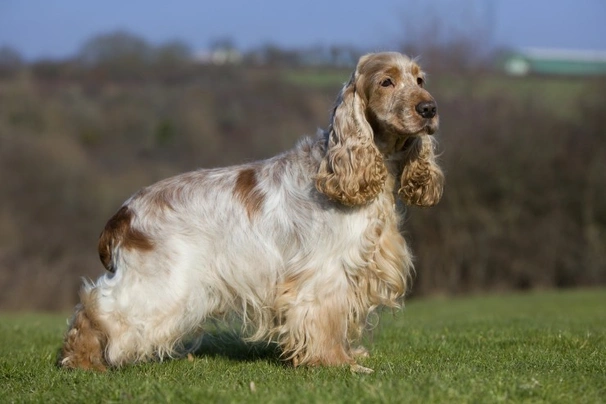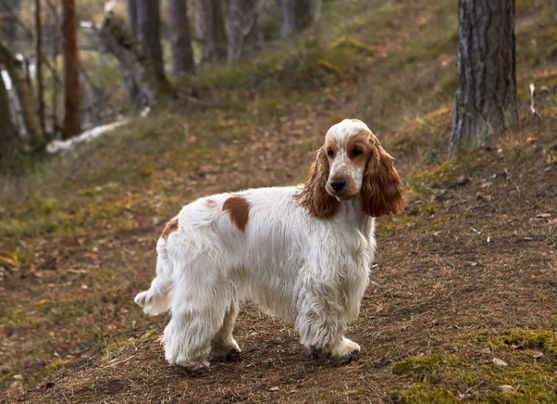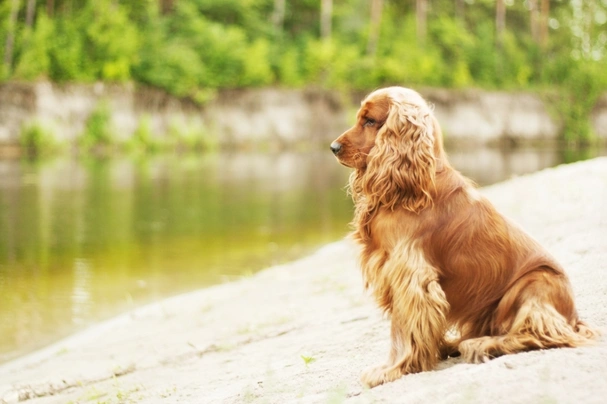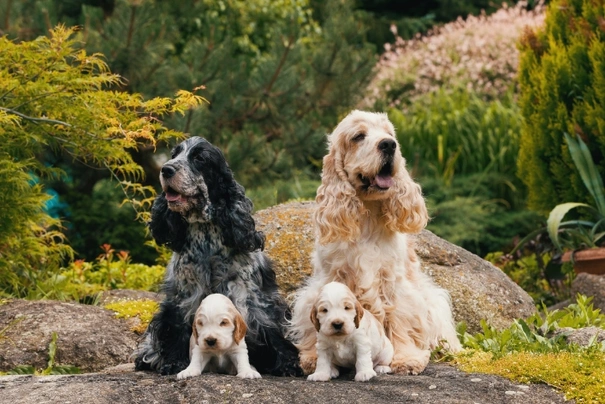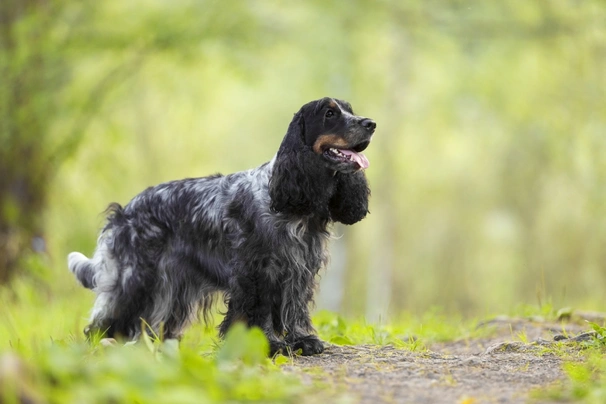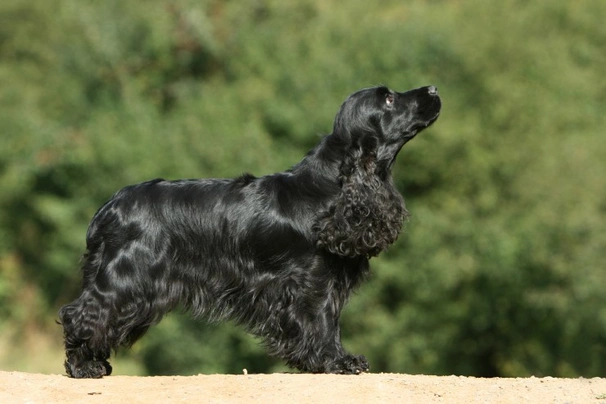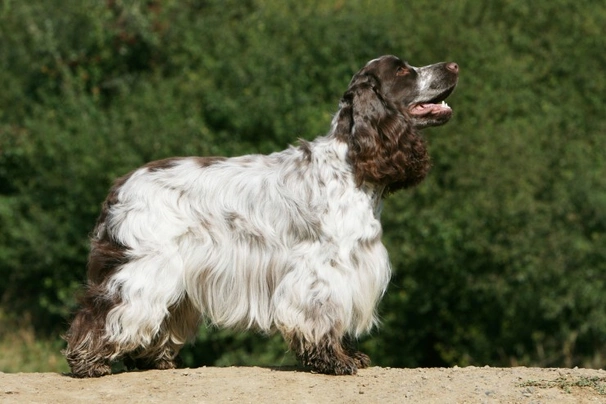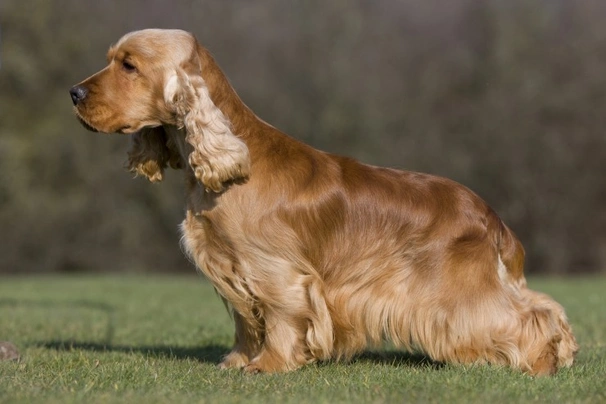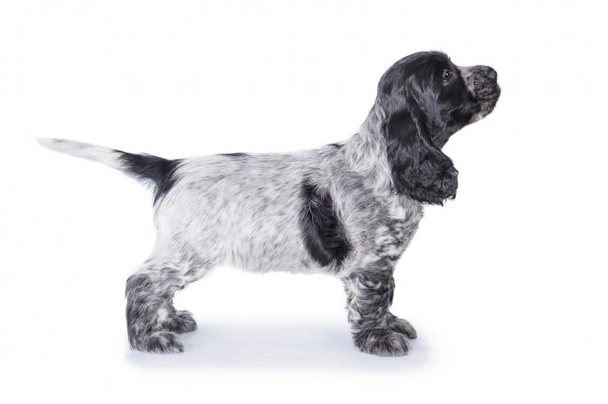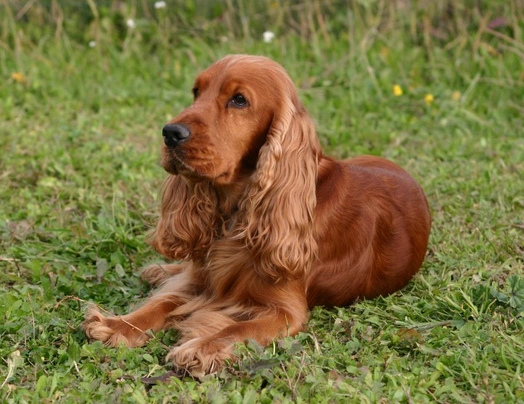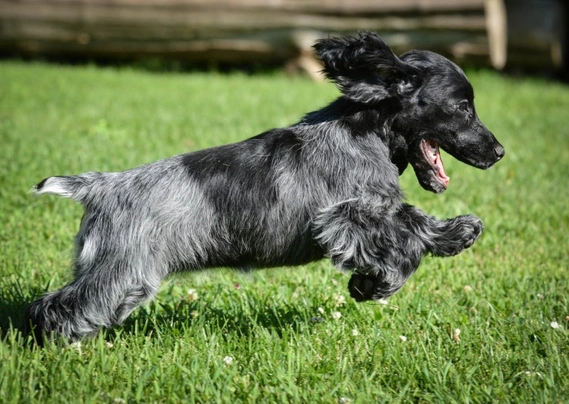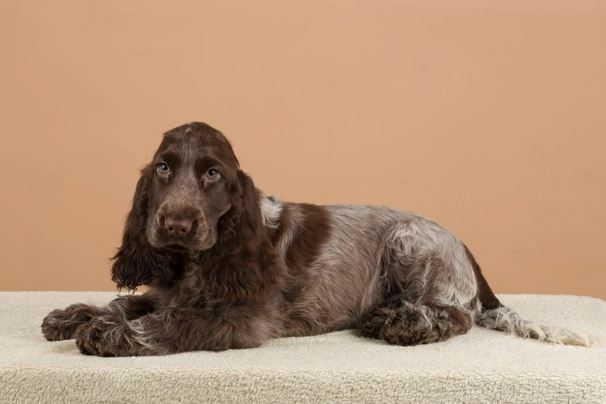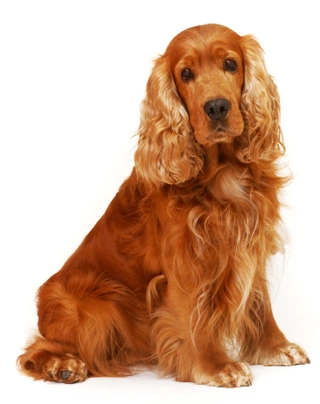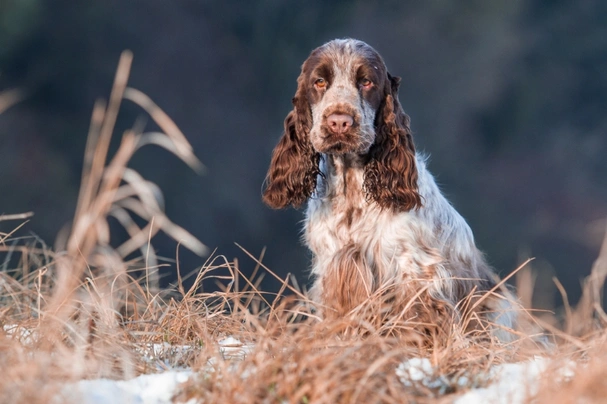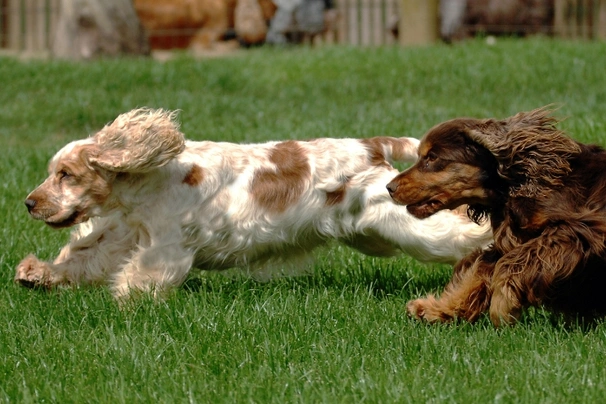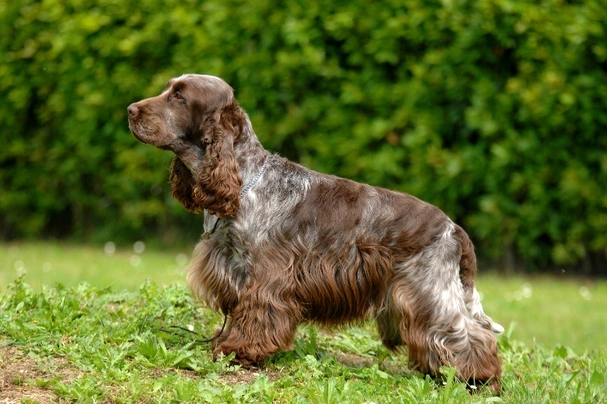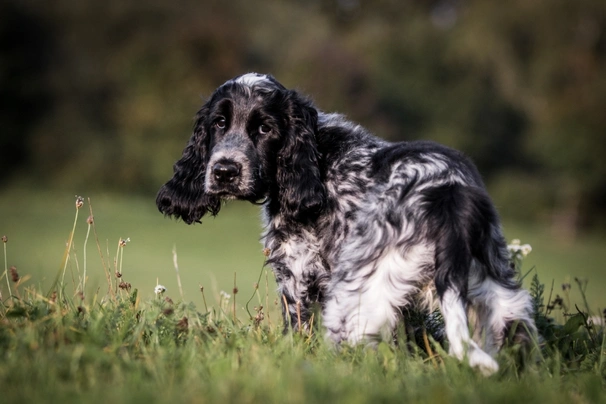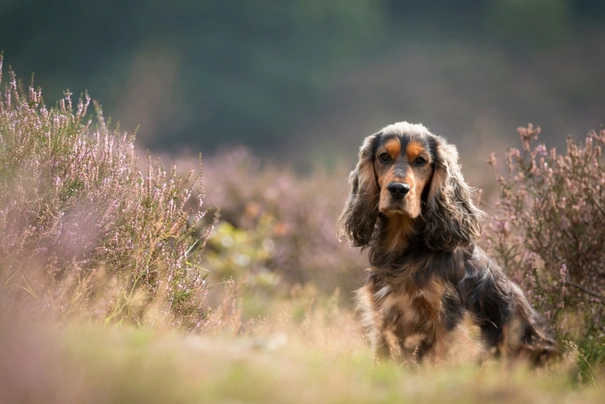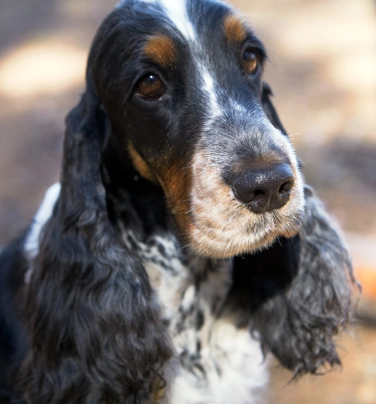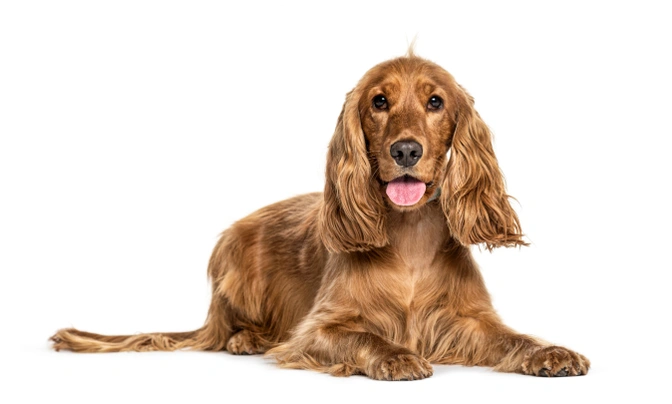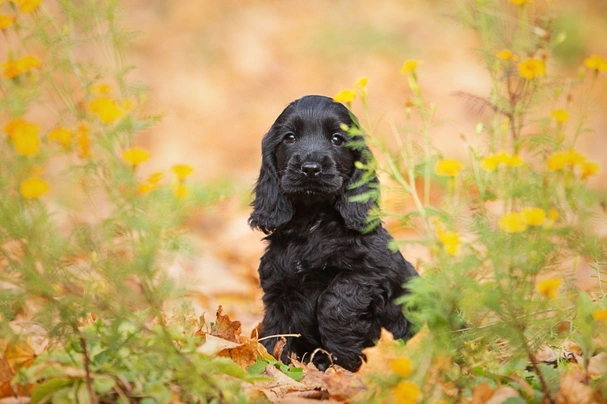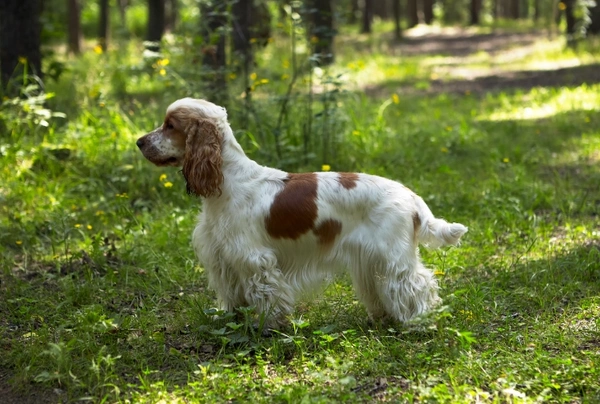Cocker Spaniel
Pros
Cons
Introduction of the Cocker Spaniel
Originally bred as a working gundog the Cocker Spaniel has consistently been one of the UK's most popular family pets for decades. Over the years the breed has also made its mark in many other countries of the world both in the field and a home environment. They are happy energetic dogs that adapt well to most lifestyles. Cockers are extremely intelligent they boast having kind patient loyal natures and are never happier than when exploring a back garden park or countryside with their noses glued to the ground.
The Cocker Spaniel is just at home in a home environment as they are out in the field and will happily retrieve objects around the house garden or when out on a walk much as they would when working. They love to please which in short means they are highly trainable. The dogs we see today were recognised as a breed when the Kennel Club was first established in 1873.
It's worth noting there are two definite types of Cocker Spaniel one being used in the field as a working dog and therefore quite a bit lighter and the other being a show dog which have quite a bit heavier and sturdier build. Cockers need to know who is the boss and occasionally need to be reminded of this because they are much happier dogs when they know their place in the pack and who to look up to when they need any sort of guidance and direction.
History of the Cocker Spaniel
Cocker Spaniels have a fascinating ancestry being descendants of one of the oldest breeds namely the spaniel. There are records of spaniels that date back to the time of Chaucer in the 14th Century and Shakespeare during the 16th and 17th Centuries. However there are those who believe that spaniels arrived on British shores far earlier than that and it was at the time of the Roman invasion during 54 and 55 BC that these charming dogs were introduced to the country. It is thought that spaniels may well have originated in Spain mainly because the name "spaniel" could come from the word Hispania which we now know as Spain. Others believe their name could have come from a French phrase which is Chiens de l'Espagnol which translated means Spanish Dogs.
Throughout time spaniels were specifically bred to work flushing out game for hunters in challenging terrains and were highly prized by the late 1600's whether they were asked to work on land or marshlands and water. Originally there were two "types" being land and water spaniels. It was only in the 19th century that enthusiasts began to separate them with "land" spaniels becoming a more specialised breed although there is no evidence of them being used to retrieve game at that point in time but rather to drive it towards the hunter. However things changed during the 17th Century when spaniels began being used as gun dogs.
Cocker Spaniels were not recognised as a specific breed by the Kennel Club because Springer Spaniels could produce different types of puppies in one single litter namely Springers Sussex and Cocker Spaniels. The first of the modern Cocker Spaniels we see today first appeared in 1879 were Obo the offspring of a Springer Spaniel a field spaniel.
By the mid eighteen hundreds other spaniel breeds appeared on the scene but it was not until the Kennel Club was established here in the UK in 1874 that any dog under a certain weight (11 kg) was deemed to be a Cocker. In 1885 a breed standard was set with enthusiasts introducing more desired traits in the breed. Over time the Cocker Spaniel became a consistent winner not only at dog shows like Crufts which the breed has won more times than any other but with families and owners alike due to their charming looks and ultra-kind natures.
Interesting facts about the breed
- Tail Docking has been carried out on Cockers for centuries. However today this practice has now been banned in the UK for the well-being of the dog
- There are 2 strains of Cocker Spaniels namely the show strain and the working strain with the working Cocker having a much lighter build than a show Cocker and they have finer coats as well as less feathering than their show counterparts
- Cocker Spaniels are quite different looking than the American Cocker Spaniel
Appearance of the Cocker Spaniel
Height at the withers: Males 39 - 41 cm Females 38 - 38 cm
Average Weight: Males 13 - 14.5 kg Females 13 - 14.5 kg
One thing about Cocker Spaniels that is so endearing to many is their happy and kind personalities always ready to wag their tail and ultra-eager to please. They are sturdy compact looking little dogs that are never happier than when they are being kept busy. There is a distinct difference in the appearance of a working Cocker Spaniel and a Show Cocker with working dogs being lighter they have finer coats and far less feathering than show dogs.
Cocker Spaniels have charmingly square muzzles with well-developed skulls which are nicely proportioned giving them their unique and endearing looks. Their eyes are typically dark or brown in colour and nicely rounded not protruded at all. Dogs with liver or liver roan coats as well as liver and white dogs have hazel coloured eyes that blend in well with their colouring which is totally acceptable as a breed standard. Cockers are considered to have an intelligent look in their eyes gentle yet always very alert.
Ears are long and lobular always lying close to a dog's head. A Cocker's jaw is strong with a perfect bite a physical trait these dogs needed when carrying and retrieving game. Cockers as previously mentioned are well-proportioned compact little dogs with strong legs and nicely formed toplines that slope gently from the wither to the tail.
Chests are well developed being neither too narrow or too wide. Their hindquarters are nicely rounded and muscular. They have very cat-like feet being well padded. Cockers always carry their tails level to their bodies. One of their endearing traits is the eagerness with which they are willing to wag their tails not only when happy but when they are tracking down a scent too.
Under their breed standard Cocker Spaniels should have "flat silky coats to the touch that should never be wiry or wavy nor should their coat be too curly or profuse" and their front and back legs as well as their bodies should be well-feathered. Some Cockers have a slight wave in their coats and although very rare dogs can have very curly coats too which is thought to be a throwback to their water spaniel lineage.
Show Cockers boast lovely flat and silky coats with lots of feathering on legs and trim. One of the most attractive physical traits the Cocker Spaniel boasts is their amazing variety of acceptable colours under the Kennel Club Breed Standard being as follows:
- Black
- Black & Tan
- Black & White
- Black & White Ticked
- Black White & Tan
- Blue Roan
- Blue Roan & Tan
- Chocolate
- Chocolate & Tan
- Chocolate & White
- Chocolate Roan
- Chocolate Roan & Tan
- Chocolate White & Tan
- Golden
- Lemon & White
- Lemon Roan
- Liver
- Liver & White
- Liver & White Ticked
- Liver Roan
- Liver Roan & Tan
- Liver White & Tan
- Orange & White
- Orange & White Ticked
- Orange Roan
- Red
It is worth noting that sable coloured Cocker Spaniels cannot be registered with the Kennel Club.
Dogs with solid colours can have white marks on their chests which can be varying in size and when puppies with solid colours are first born they can have white marks around the tip of their muzzles and/or toes which usually start disappearing once they start growing often vanishing altogether. Black Cockers can have varying shades of black but the genetically pure black Cocker Spaniels have coats that are typically raven black
Gait/movement
Cockers move with true drive and they cover a lot of ground always looking keen and alert when they do.
Faults
The Kennel Club frowns on any exaggerations or departures from a Cocker Spaniel's breed standard. The more exaggerated a trait is the more it is regarded as being a fault because it could affect the overall wellbeing and health of a dog as well as their ability to work.
Male Cockers should also have two normal testicles fully descended in their scrotums.
It is also worth noting that the Kennel Club offers guidelines for the size and weight of a Cocker Spaniel. As such some Cockers may be a little larger or smaller and they can also weigh a little less or a bit more than stated in their KC breed standard.
Temperament of the Cocker Spaniel
Cocker Spaniels are renowned for their gentle and loving natures. They are full of life and are always ready and eager to please their wagging tails are usually all the proof a person needs to see how "merry" these dogs can be. They are consistently one of the most popular family pets for this reason. The one thing you need to bear in mind is that a Cocker will form a stronger bond with the person who feeds them. They are incredibly loyal characters that show a determination and resilience when needed.
However Cocker Spaniels need to know who is alpha dog or they may start displaying a more dominant side of their character. They are quite sensitive to loud noises which can stress them out as can any heavy handling which could result in a nervous and timid dog. Cockers benefit from positive reinforcement training and need to be handled firmly yet very gently when they are being put through their paces. They also need to be given lots of mental stimulation to be truly happy and healthy dogs.
As a rule Cockers make good family pets when given the correct training exercise and leadership and can form close relationships with family members. In a working capacity there are few dogs which can cover all types of ground and terrain including working in thorny and thick bush and hedgerows with the same grace and poise of a Cocker Spaniel. And everyone knows that Spaniels love of water. This is something to bear in mind when walking anywhere near water especially in freezing weather when thin ice may be a problem. Another thing worth noting is that many Show Cocker Spaniels have retained their natural instinct to "work" which is another reason these dogs are so interesting and fun to have around and why they do better when they are kept busy and well exercised.
Are they a good choice for first time owners?
Cocker Spaniels have remained one of the most popular family pets the world over thanks to their gentle kind natures and because they are so amenable they are a wonderful choice for first time owners.
What about prey drive?
Cockers have a medium to high prey drive but the good news is that with correct training and handling it is possible to gently curb this trait. Teaching a Cocker the ground rules and boundaries from an early age together with instilling a strong recall response all helps reduce the risk of a Cocker taking off after another animal they come across or spy in the distance.
What about playfulness?
Cocker Spaniels are renowned for being playful and of having a real sense of humour. They enjoy playing interactive games and like nothing more than to keep an owner entertained which they do well into their senior years.
What about adaptability?
Cockers are highly adaptable dogs and will happily live in an apartment setting providing they are given the right amount of daily exercise and mental stimulation. A bored Cocker would quickly find ways to entertain themselves which could see dogs being destructive around the home and excessive barking.
What about separation anxiety?
Cockers form strong bonds with their owners and families which in short means they are not happy when left to their own devices for any great length of time. They are better suited to households where one person stays at home when everyone else is out or in homes where there are other dogs and pets.
What about excessive barking?
A bored Cocker Spaniel may well start barking excessively which is why it's so important for them to be well exercised every day which should always include lots of mental stimulation. With this said a tired Cocker is a well-behaved dog and a bored Cocker that’s not given enough to do will quickly develop behavioural issues which includes excessive barking**.**
Do Cocker Spaniels like water?
Cocker Spaniels have a real affinity with water and will jump in whenever they can which is why it's important to take extra care when walking a Cocker anywhere near more dangerous water courses.
Are Cockers good watchdogs?
Cocker Spaniels are not known to be good watchdogs but they will bark if anyone comes to the door or if they think something untoward is going on in their environment.
Intelligence / Trainability of the Cocker Spaniel
Cocker Spaniels are very intelligent dogs with the added bonus being they love to please and are always willing to learn new things they are taught. As such they are easy to train providing their education starts early and their training is consistent throughout their lives. Housetraining is not usually an issue with a Cocker because they quickly learn where to do their "business".
Cockers need to be taught basic obedience from the word go and they should know the boundaries and limits an owner sets for them which they don't typically test once they know the rules. The first commands to teach a Cocker are as follows:
- Sit
- Stay
- Come
- Wait
- Leave
- Quiet
- Bed
Cockers enjoy taking part in all sorts of canine sports which includes activities like agility flyball and obedience all of which they breed is known to excel at. A lot of Cocker Spaniels show a natural ability to work alongside hunters and quickly learn what they are asked to do when out in the field.
Children and other
Cocker Spaniels are known to be very tolerant and patient with children of all ages which is one of the reasons they have remained such popular family pet the world over. With this said any playtime or interaction between the kids and a dog should always be well supervised especially when toddlers are around. If well socialised when puppies Cocker Spaniels tend to be very good around other family pets and this includes cats and small animals commonly found in the home which is also due to the fact they are very social dogs by nature.
As with any other breed it's always a good idea to make sure any introductions to new animals and dogs goes smoothly which means you must be there and to make sure nothing happens that could make the introductions stressful.
Health of the Cocker Spaniel
The average life expectancy of a Cocker Spaniel is between 11 to 12 years and even longer when properly cared for and fed an appropriate good quality diet to suit their ages and any health issues a dog may be suffering from.
However the breed is known to suffer from and develop certain hereditary and congenital health issues as well as some acquired ones which are worth knowing about if you are hoping to share your home with a Cocker Spaniel.
According to a survey carried out by the Kennel Club here in the UK cancer is one of the leading causes for the death of around 30% of Cockers. Other commonly seen disorders include the following:
- Skin allergies
- Benign tumours
- Deafness
- Bite problems
Eye issues are also a concern in the breed with Cocker Spaniels being known to suffer from the following disorders:
- Progressive Retinal Atrophy (PRA) - an inherited eye disorder with the most common form of the disease seen in Cocker Spaniels being General Progressive Retinal Atrophy or GPRA. Dogs as young as 18 months old can develop the condition although some Cockers only show any symptoms when they are 7 years old or so. The condition is caused by an autosomal recessive gene which means both parent dogs must carry the gene in order to pass it on to their offspring
- Retinal Pigment Epithelial Dystrophy (RPED) - a condition that was once known as Central Progressive Retinal Atrophy (CPRA) and studies have established that the condition is linked to an inherited metabolic inability for dogs to circulate Vitamin E in their systems. Dogs suffering from the condition may be able to retain their peripheral sight but their overall vision is negatively impacted. For the moment there is no DNA test available and it is not known just how the genetic defect is passed on from a parent to their offspring
- Primary Glaucoma - a very painful eye disorder where a build-up of fluid behind a dog's eye causes all the problems thanks to an inherited abnormality which is the site of a drainage angle in a dog's eyes. Any dog that develops the condition would lose their sight and an affected eye typically often should be surgically removed. Fortunately there is a test for dogs with a predisposition to the condition which is part of the BVA/KC eye testing scheme. It is a one-off test that Cocker Spaniels should undergo. The exact reason why Cockers inherit the disorder however remains unknown and therefore for the moment there is no DNA test available
- Cataracts
- Persistent pupillary membrane
- Distichiasis ( Too many eyelashes )
- Entropion(Eyelids Folding Inwards )
- Ectropion( Eyelids Roll Outwards )
Other health issues that can affect Cocker Spaniels include the following:
- Hip dysplasia - a DNA test is available
- Patellar luxation
- Canine dilated cardiomyopathy
- Heart murmurs
- Autoimmune Disease covers various immune-mediated disorders which includes Addisons Disease Hypothyroidism Haemolytic Anaemia to name but four with Cockers being more predisposed to suffering from Haemolytic Anaemia. It is not yet known if the disorder is inherited but research suggests that age sex and environment could play a role in why some dogs develop the condition
- Familial nephropathy (FN) - a fatal hereditary condition that affects a Cocker's kidneys and is a disorder seen in young dogs. It's caused by a recessive gene and since the mid-eighties a Control Scheme was established to record all dogs both male and female that were diagnosed as suffering from FN and which could no longer be used in a breeding programme
- Chronic pancreatitis has been reported in the breed with some Cockers developing diabetes mellitus as a result of suffering from the condition
- Mammary tumours
- Acral Mutilation Syndrom (AMS) is a condition that's seen in puppies from working lines of the Cocker Spaniel. AMS causes lesions due to self-mutilation thanks to a loss of sensitivity in these regions of the body. It is caused by a simple autosomal recessive gene which in short means both parents need to carry the gene for them to pass it on to their offspring. Fortunately there is a DNA test available
- Adult Onset Neuropathy (AON) is an autosomal recessive disorder seen in older Cocker Spaniels when they are anything from 7 to 9 years of age. There is a DNA test available in the UK which is carried out by Laboklin UK
Another issue that is associated with Show Cockers is a condition known as Rage Syndrome although luckily this is relatively rare. Dogs for no apparent reason will suddenly attack another dog quite savagely without giving any warning they are about to do so. When it does happen a Cocker (or other breed) will typically have a glazed look about their eyes and they appear to be totally unaware of where they are and their surroundings. It has been reported that Cocker Spaniels with solid coloured coats are more prone to suffering from Rage Syndrome although it has to be said it is very rare.
More about ear problems
Because Cockers have long pendulous ears they are more at risk of developing ear infections. Their longer ears offer protection to a dog's inner ear but at the same time moisture can get trapped inside which offers the perfect environment for bacteria to thrive in. Making sure air can circulate in a dog's ears is essential to prevent this from happening and it's important to thoroughly dry a dog's ears whenever they get wet. It's also a good idea to keep their ears trimmed and to check that no grass seeds or other debris has got lodged in a dog's inner ear which can lead to a painful infection flaring up. Regularly checking a Cocker's ears helps recognise when there's too much build-up of wax which could also trigger an infection.
What about vaccinations?
Puppies should be vaccinated when they are around 8 10 and 12 weeks old with most vets recommending that dogs are given annual boosters for the rest of their lives although there is some debate as to whether boosters are necessary so it’s important to discuss this with a vet before making a final decision. With this said any Cocker going into a boarding kennel must have their vaccinations up to date.
What about spaying and neutering?
Cockers like other breeds should be spayed and neutered at the right time. Females can be spayed when they are 6 months old and male Cockers can be neutered when they are 6 months old too.
What about obesity problems?
Cocker Spaniels are known to like their food with some dogs liking it a little too much which is why it's important to keep an eye on a dog's weight and to adjust the amount of food they fed every day accordingly. Obesity can shorten a dog's life span by several years and it puts them more at risk of developing serious health issues. Food treats should be kept to a minimum because this could also add too many calories to a Cocker’s diet.
What about allergies?
Cocker Spaniels are prone to suffering from allergies and it's important to identify the problem as soon as possible. Finding the triggers for allergies often proves challenging and it takes time and patience to establish just what is causing the problem. The most common triggers are as follows:
- Diet
- Environment
- Parasites (fleas)
- Pollen and grasses
- Chemicals commonly found in household products
Recognising health issues in Cocker Spaniels
As with any other breed recognising when a Cocker Spaniel may be developing some sort of health concern early often makes their condition that much easier to treat and the prognosis for certain conditions tends to be better too. This is especially true of ear and eye infections. The earlier a problem can be diagnosed and treated the better with the outcome typically being that much better too.
Participating in health schemes
There are many health schemes available for Cocker Spaniels and both breeders and owners should be aware of them as it is the only way of ensuring hereditary and congenital health issues are not passed on to a dog's offspring thus ensuring the health of the breed. The scheme available are as follows:
- PRA - BVA eye testing scheme
- Primary glaucoma - BVA/KC eye testing scheme
- Hip dysplasia - Kennel Club/BVA Hip Scoring scheme
- GPRA - results of tests can be found on the Optigen website
- Familial nephropathy test provided by Antagene (France). Results of tests can be found on the Kennel Club website
- Adult Onset Neuropathy (AN) - DNA test provided by Laboklin UK
What about breed specific breeding restrictions?
The Kennel Club observes strict breeding restrictions for pedigree dogs which can be found on their site and which all potential buyers should be aware of. This includes the number of litters a dam has produced and her age. Currently there are no breed specific restrictions.
What about Assured Breeder Requirements?
Assured Breeders are required to follow schemes and tests as well as advice relevant to Cocker Spaniels which includes the following
- DNA test - prcd-PRA
- DNA test - FN
Other tests and schemes that all breeders should follow include the following:
- BVA/KC Hip Dysplasia Scheme
- BVA/KC/ISDS Gonioscopy
Caring for the Cocker Spaniel
As of 2007 docking tails was banned here in the UK although there are exceptions allowed but only under the strict guidelines defined by the law. You should never consider purchasing a Cocker Spaniel puppy with a docked tail because there are very heavy fines for having this done to a dog where permission has not been officially granted.
As with any other breed Cocker Spaniels need to be groomed on a regular basis to make sure their coats and more especially their skin is kept in tip-top condition. They also benefit from being professionally groomed at least 3 times a year. Being high energy dogs Cockers need to be given regular daily exercise so they remain fit and healthy. On top of this they need to be fed a good quality diet throughout their lives to ensure all their nutritional needs are met.
Caring for a Cocker Spaniel puppy
Cocker Spaniel puppies have a ton of energy and playtime can be boisterous. It's important for their education to begin from day one of arriving in the home. Setting ground rules limits and boundaries also helps a puppy settle into a new environment and it helps them understand what their owners expect of them when still young. It's also important to time when a puppy is introduced to a new home and to make sure they are not left on their own which is why it's best to time their arrival when people are going to be at home for a few days.
Puppies would have been wormed by the breeder which is information that should be included in their paperwork along with details of microchipping but it's important for them to be wormed again when the time is right once they arrive in their new home. They should be wormed regularly as follows:
- Puppies should be wormed at 6 months old
- They need to be wormed again when they are 8 months old
- Puppies should be wormed when they are 10 months old
- They need to be wormed when they are 12 months old
It's also a good idea to set up a nice quiet corner for a puppy's crate or bed bearing in mind that puppies can sleep for up to 21 hours a day in between bouts of boisterous play but it has to be somewhere you can keep an eye and ear on them so not too out of the way. It's also good for puppies to know someone is around without having to put up with too much traffic passing them by which could disturb their napping time.
Things you'll need for your new puppy
New owners need to get certain things prior to bringing a puppy home and to make sure the house has been "puppy proofed" so they don't get themselves into trouble. Puppies are small and inquisitive which means they can squeeze themselves into small spaces which is why many owners limit the amount of room their pets roam in. Fitting child gates on doors is a great way of keeping a puppy safe or investing in a playpen is another way of ensuring a puppy cannot get into trouble. Other things that are needed before a puppy arrives in their new home includes the following:
- Food and water bowls preferably ceramic and not too deep
- Lots of good quality toys and chews for puppy to gnaw on. Puppies start teething anything when they are 3 to 8 months of age so it's important to provide them with safe things to chew on
- A grooming glove
- A slicker brush or soft bristle brush
- Dog specific toothpaste and a toothbrush
- Scissors with rounded ends
- Dog shampoo and conditioner which has to be formulated for use on dogs
- A well-made dog collar and/or harness
- A good quality dog bed that's not too small or too big
- A crate that's not too small or so big that puppy feels lost in it
- Baby blankets to put in your Cocker Spaniel's crate and their beds for when they want to nap or go to sleep
- A grooming mat
Feeding guide for Cocker Spaniel puppies
A good breeder would give all new owners a feeding schedule for their puppies and it's important to stick to this for the first few weeks to avoid any digestive issues. A puppy's diet can be changed but this must be done gradually over the course of 4 weeks and if puppy does get a tummy upset to put them back on their original diet before asking advice from the breeder or the vet. It's important to feed a puppy at the same time of the day to establish a routine which is another way of helping them settle into their new homes that much faster. Below is a rough guide as to how much to feed a puppy every day for the first few months of their lives:
- 2 months old - 150 g to 208 g depending on a puppy's build
- 3 months old - 176 g to 246 g depending on a puppy's build
- 4 months old - 187 g to 264 g depending on a puppy's build
- 6 months old - 189 g to 270 g depending on a puppy's build
- 7 months old - 171 g to 250 g depending on a puppy's build
- 8 months old - 153 g to 233 g depending on a puppy's build
- 10 months old - 136 g to 194 g depending on a puppy's build
- 11 months old - 134 g to 192 g depending on a puppy's build
Keeping the noise down
As previously mentioned Cocker puppies need to sleep a lot which can be anything up to 21 hours a day. They are also very sensitive to noise which in short means keeping the noise levels down in the home and this includes the volume of a TV and other devices.
Keeping vet appointments
It is also very important to keep all vet appointments not only for puppy to have all their vaccinations but also to get them used to going in the car and visiting a veterinary surgery where there are lots of strange smells that puppies can find scary.
What about older Cocker Spaniels when they reach their golden years?
When Cocker Spaniels reach their golden years like all other breeds they are more at risk of developing health issues. Older Cockers are less likely to respond as quickly as they once did and they may be a little less reluctant to go out on walks. Their vision and hearing might not be as good as it was when they were younger all of which needs to be factored into their daily care and needs. In short they need to be shown a lot more in the way of patience and understanding more especially if their cognitive function is not as good as it used to be.
Physically Cocker Spaniels will start to have a greying muzzle but there will be other noticeable changes too which includes the following:
- Coats become coarser
- A loss of muscle tone
- Cockers can either become overweight or underweight
- They have reduced strength and stamina
- Older Cockers have difficulty regulating their body temperature
- They often develop arthritis
Immune systems do not work as efficiently as they once did which means older dogs are more susceptible to infections
Older Cockers can change mentally too which means their response time tends to be slower as such they develop the following:
- They respond less to external stimuli due to impaired vision or hearing
- They tend to be a little pickier about their food
- They have a lower pain threshold
- Become intolerant of change
Living with a Cocker in their golden years means taking on a few more responsibilities but these are easily managed and should include rethinking their diet the amount of exercise they are given how often their dog beds need changing and keeping an eye on the condition of their teeth. Older dogs should be fed a good quality diet that meets their needs at this stage of their lives all the while keeping a close eye on a dog's weight.
Grooming of the Cocker Spaniel
Cocker Spaniels are high maintenance in the grooming department mainly because of the length of their coats. The require frequent daily grooming to keep knots and tangles at bay. They also benefit from being taken to a professional grooming parlour every 2 to 3 months so they can be clipped out or hand stripped which makes keeping their coats in good order that much easier.
Ideally Cockers benefit from a daily quick brush over more especially after they have been out for a walk because it means any thorns or other debris can be removed from their coats sooner rather than later. Then once a week it's a good idea to give a Cocker Spaniel a thorough groom which is something most of them really enjoy more especially if it has become a routine that started when they were puppies. It's best to groom Cocker puppies and adult dogs on a table making sure they are never left unattended which could result in a dog jumping off and injuring themselves.
When it comes to how often a Cocker Spaniel would need to be bathed it depends on several things which includes the time of the year and how dirty a dog gets after they have been out for a walk. It's also important to use a dog specific shampoo and conditioner because it will have the correct pH balance. Cockers benefit from being professionally groomed several times a year and although this can add to the cost of owning them it makes it that much easier to keep their coats in good condition in between visits to the grooming parlour which is typically every 8 weeks. Neutered male Cockers tend to need more in the way of trimming thanks to the fact their coats tend to become thicker and woollier once they've been neutered.
Because Cockers are naturally drawn to water they have a tendency to get muddy especially during the wetter months. As such regular bathing could be necessary although you must be careful not to overdo it. Cockers are prone to allergies and too much bathing will end up altering the balance of natural oils found in their skin and coats making an allergy worse or it could trigger one.
Grooming tools needed for Cocker Spaniels
The grooming tools needed for Cocker Spaniels are as follows:
- A pair of thinning scissors
- Plain shears to trim around a dog's feet
- A good quality pair of nail clippers
- A small file
- A comb
- A slicker brush
- A bristle brush
- A grooming mat
Exercise of the Cocker Spaniel
Cockers need to be given regular brisk daily exercise that includes lots of mental stimulation for them to be truly happy and well-balanced dogs. They are high energy active dogs and they like nothing more than being out and about exploring the great outdoors with their nose to the ground following a scent. It is worth noting that Cockers bred from working lines generally need much more in the way of exercise and benefit from being allowed to run free so they can really express themselves but this should only be in a safe environment. Cockers thrive on playing interactive games which is not only a great way of giving them lots of physical exercise but it also keeps them mentally stimulated too.
Cocker puppies don't need to be given lots of exercise to begin with because they are still growing and developing which means they just need to have a play in the garden for the first few weeks. It's important however for them to be well socialised which means they need to be introduced to new situations people and other animals as soon as possible. A puppy’ bones and joints have generally developed sufficiently when they are around 6 months old which is when they can go for longer walks without the risk of them damaging their joints. With this said walks should never be so long that a young Cocker is tired out. It's best to increase the time they are out a little at a time.
Older more mature Cocker Spaniels enjoy a good 30 minute brisk and interesting walk twice a day and they like nothing better than to spend as much time in a garden as possible. Working Cockers need a lot more in the way of exercise and mental stimulation to be truly happy but both show dogs and working dogs enjoy playing interactive games with their owners as often as possible. One thing to bear in mind is that it is never a good idea to let Cocker Spaniels off their leads when they are around livestock.
Feeding of the Cocker Spaniel
Like all dogs Cocker Spaniels need to be fed a good quality nutritious diet to suit their ages and the amount of daily exercise they are given. Over-feeding a Cocker would result in them putting on weight and this can lead to all sorts of health issues. It can affect their joints bones and heart which is especially true if a dog is still growing and developing. Carrying too much weight puts a lot of extra strain on their hips and backs too. It can also lead to a dog developing some sort of heart disease**.** Working Cockers generally need to be fed a diet that's higher in protein so it provides the extra energy they need to work.
The same goes for adult more mature Cocker Spaniels they need to be fed as per the pet food manufacturers guidelines whether you opt to feed a dog a wet or a dry diet. You also must make sure a dog has access to plenty of fresh clean water. If you share your home with a Working Cocker they would need to be fed a higher protein diet because of the extra energy they expend.
Cocker Spaniel price
You would need to pay out anything from £430 to well over £1000 for a pedigree Kennel Club registered Cocker Spaniel puppy. The cost of insuring a male 3-year old Cocker Spaniel in the north of England would be just over £19 a month for basic cover to over £38 a month for a lifetime policy (quote as of August 2017). It's worth noting that lots of things are factored in when a company calculates a dog's insurance premium and this includes where you live in the UK and a dog's age.
Cockers need to be fed a good quality nutritious diet and one that suits their ages. You should expect to pay around £30 to £50 per month on food. You would also need to pay for all the vet fees involved in owning a dog which generally stands at around £1000 per year. This includes neutering or spaying the cost of vaccinations and annual health checks.
As a rough guide the average cost of keeping a caring for a Cocker Spaniel would set you back around £80 to £90 a month depending on the type of insurance cover you opt to buy for your dog but this does not include the price of buying a well-bred pedigree Cocker Spaniel puppy.
Buying advice
When visiting and buying any puppy or dog there are many important things to consider and questions to ask of the breeder/seller. You can read our generic puppy/dog advice here which includes making sure you see the puppy with its mother and to verify that the dog has been wormed and microchipped.
When buying a Cocker Spaniel the size of a dog as stated in the Kennel Club Breed Standard is only a guide and is given as being the ideal for the breed. As such a Cocker Spaniel could be smaller or larger and may weigh slightly more or less than the given size in their breed standard.
Cocker Spaniels are extremely popular both in the UK and elsewhere in the world which means that well-bred dogs can command lots of money and more especially if they are bred from working lines. As such with Cocker Spaniels there is specific advice questions and protocols to follow when buying a puppy which are as follows:
- You should notconsider purchasing a Cocker Spaniel puppy with a docked tail because there are very heavy fines for having this done to a dog where permission has not been officially granted. There are certain circumstances where a dog may have its tail docked legally pleasesee herefor more details.
- There are many online and other adverts showing images of beautiful Cocker Spaniel puppies for sale. However the sellers ask buyers for money up front before agreeing to deliver a puppy to a new home. Potential buyers should never buy a Cocker Spaniel puppy unseen and should never pay a deposit to a seller before collecting a puppy from them
- Cocker Spaniels as previously touched upon are among the most popular breeds in the UK and therefore puppies can command a lot of money. As such there are many amateur breeders/people who breed Cockers far too often so they can make a quick profit without caring for the welfare of the puppies their dam or the breed in general. Under Kennel Club rules a dam can only produce 4 litters and she must be between a certain age to do so. As such anyone wishing to buy a Cocker Spaniel puppy should think very carefully about who they purchase their puppy from and should always ask to see the relevant paperwork pertaining to a Cocker's lineage their vaccinations and their microchipping
